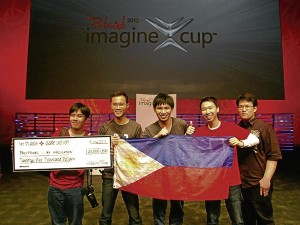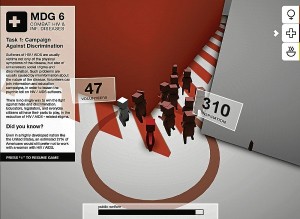Boys who ‘would get nowhere’ doing pretty well
Two years ago, a group of Xavier School “boys” already studying in different colleges in Metro Manila designed a simple video game called “Wildfire” in their bedrooms.
Months later, the team, who called themselves “By Implication,” were receiving a check for $25,000 in Poland as winners of the Microsoft Imagine Cup game design competition.
Today, the original crew of four, together with a few others of who share the passion, wants to show the country and the rest of the world that they were not one-hit wonders.
“Before joining the competition, we were always into games,” says Philip Cheng, one of the original members, went to Poland for the group’s first 15 minutes of fame.
One look at the members of the team and the impression one gets is unmistakeable: They look like the kind of people who as kids—like many others in their generation—spent countless hours in front of their TV screens with Playstation controllers in hand playing Final Fantasy or Tekken.
Yes, these were the kids that were told by their parents and teachers that their obsession with video games “would never take them anywhere.”
“But after Wildfire, we saw that we could pursue this seriously,” he says in a recent interview.
Using their prize money as seed capital, the team put up their own game design and development company called, and you guessed it, By Implication.
The company has all the makings of a great start-up operation: Offices set up in various “repurposed” rooms in their respective homes, a crew of bright nerds (and we mean that in the best way possible), and a surreal devotion to their craft. Some may find it strange, they call it passion.
They don’t operate the way a traditional corporation does either. “We consider ourselves an oligarchy,” says Levi Tan-Ong, one of the few on the team who works for the company full time. He says the opinion of each member of the team is just as important as everyone else’s. This reminds the team that before they were ever entrepreneurs with a start-up venture, they were friends first.
“Growing up, games were not just fun for us. Movies, novels, these are now considered great works of literature and art. But when these first came out, no one really thought of them that way,” Cheng says.
“We think video games are going in the same direction. This is the medium of our time,” he says.
Their first project, Wildfire, was the group’s way of projecting the spirit of volunteerism during the Ondoy and Pepeng disasters of 2009 on to a PC screen.
In the game, the player’s character roams around a town trying to recruit people to help in solving certain problems. These tasks, of course, were in line with solving various Millennium Development Goals set for the Philippines.
“The game was a reflection of a solution to disasters that is already in place in the Philippines. When the tsunami in Japan hit, every one was saying ‘pray for Japan,’ but in the Philippines, whenever disaster hits, the first thing people want to know is how they can help,” says Kenneth Yu, the group’s mentor (oldest member) who handles the “business” end of operations.
The game can be downloaded for free at wildfire.byimplication.com.
Since Wildfire, and since graduating from college, the team says it has started to move on to bigger and more profitable things.
“We are a software design and development company at this point,” Cheng says. He adds the company has started to accept outsourced work, cleaning up games and doing design work for other foreign firms.
While this keeps the company from spending more time to creating their own games, Yu says “this is what pays the bills.”
The time they spend not doing other people’s work, they devote to projects are fortunately starting to payoff.
The company’s first game for the Apple iOS mobile operating system is called Scram; a first person game where a character runs down a hallway, trying to dodge various obstacles. The goal is to reach the end of the room as fast as possible. Trip over too many hurdles, and the character falls on the floor and gets pulled back in to the darkness by some unseen villain.
Users of the iPhone, iPad or iPod touch can get the game from Apple’s App Store for $2.
Down the line, the By Implication boys want to step up to produce more complex material such as roll-playing games or RPGs. While Wildfire and Scram can be considered “casual” games where characters set out to complete certain goals, characters in RPGs are given quests that will take a player more than just a few hours behind a keyboard or a console controller to complete.
“There are a lot of game development studios in the Philippines but all of them are oriented towards doing outsourced work. But there’s potential for original Filipino content,” says Yu.
He points out By Implication also wants to diversify into other areas of the online industry by developing online applications for mobile devices. He says the group was also looking at an online publishing platform for original comics and graphic novels.
Whether their venture becomes a serious business or falters like all childish fantasies remains to be seen. But the next time anyone says video games will never take you places, you’ll know better.


